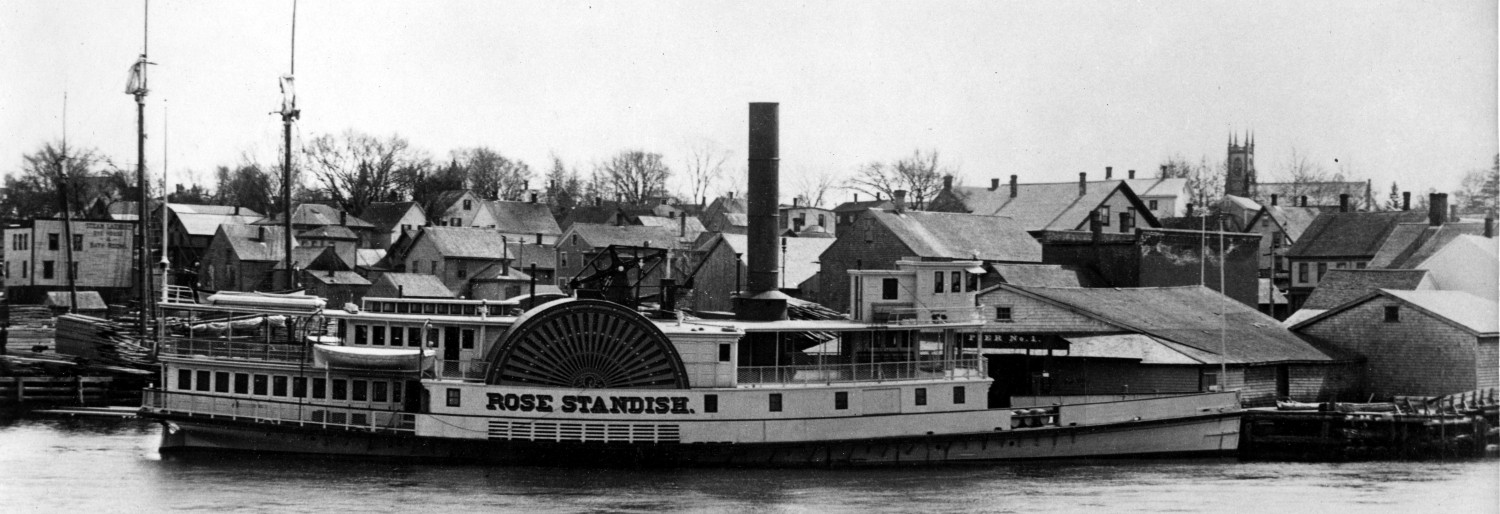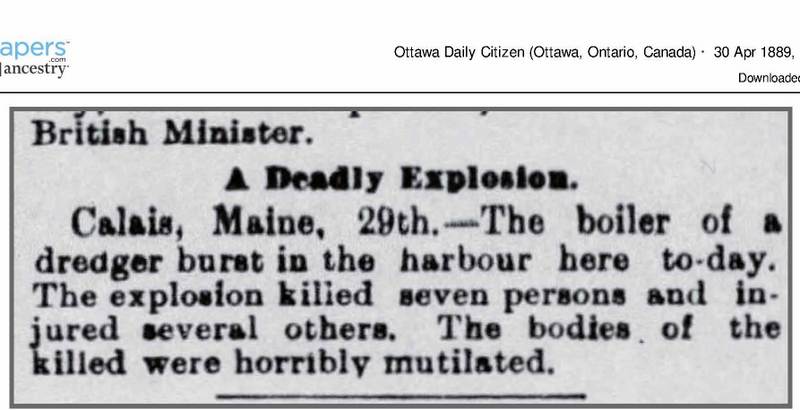
Newspapers in the 1800s were highly partisan political publications, but were generally fairly scrupulous in separating fact from fiction even when arguing, often quite eloquently, a weak political position. They were not quite so dependable, however, in the reporting of sensational news stories such as the 1889 article above.
The deadly explosion on the Calais waterfront was widely reported in the United States and Canada but not in the St. Croix Valley, as far as we can tell. We can find no information on such an incident in the local historical record and it surely would have been an important story had it occurred.
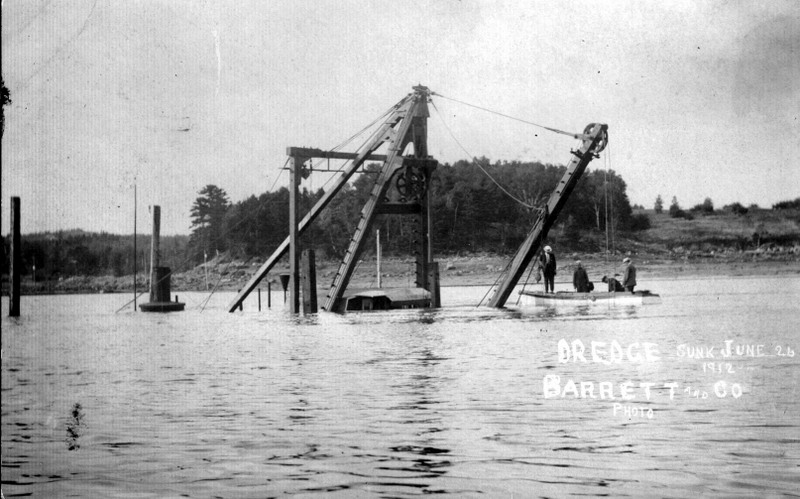
The only accident involving a dredger on the St. Croix of which we have a record is the collision of the dredge with the steamship Grand Manan in 1912, which resulted in many years of litigation over the damage to the Grand Manan and the death of one of the workers on the dredge.
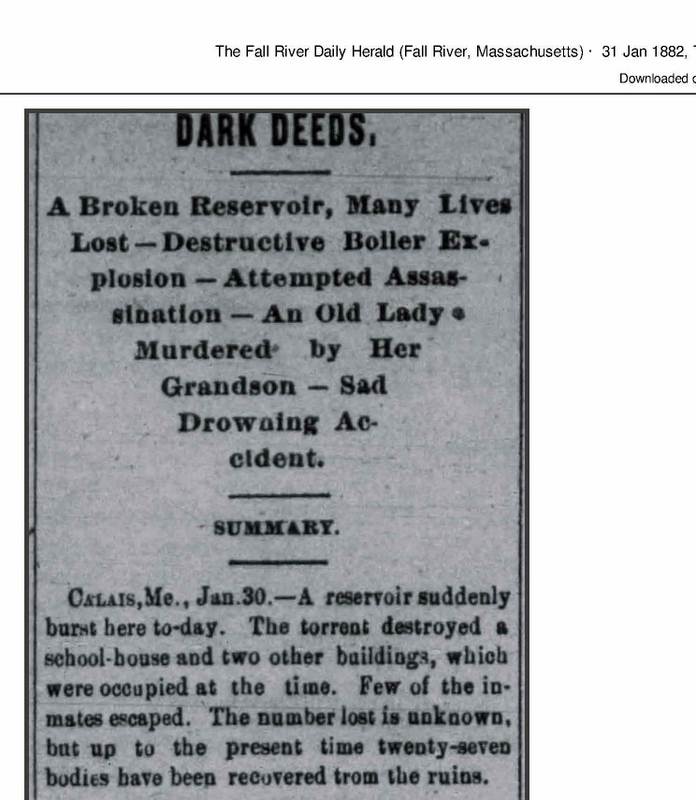
Calais Maine January 30, 1882: A reservoir suddenly burst here to-day. The torrent destroyed a school house and two other buildings which were occupied at the time Few of the inmates escaped. The number lost is unknown but up to the present time twenty-seven bodies have been recovered from the ruins.
The explanation for the dredger story may be found in this 1882 article, which flashed over the wire and around the world reporting the bursting of a reservoir here in Calais which inundated an occupied schoolhouse and several other buildings. At the time of the article, 27 bodies had been recovered and likely more remained buried.
We can tell you with some certainty that no such disaster ever occurred in Calais Maine. By sheer coincidence perhaps a reservoir in Calais France collapsed on the same day and 27 bodies were recovered from the debris. We suspect a connection and it points out a flaw in the wire reports of the time.
Calais was the main relay station for news from many parts of the world and we had a sister city in France. A newspaper in San Francisco could easily confuse a wire report from Calais as reporting an incident which had occurred in Calais, Maine even though it had actually occurred elsewhere and this confusion increased when the report originated from Calais France. We also suspect that the dredger boiler also burst in Calais, France.
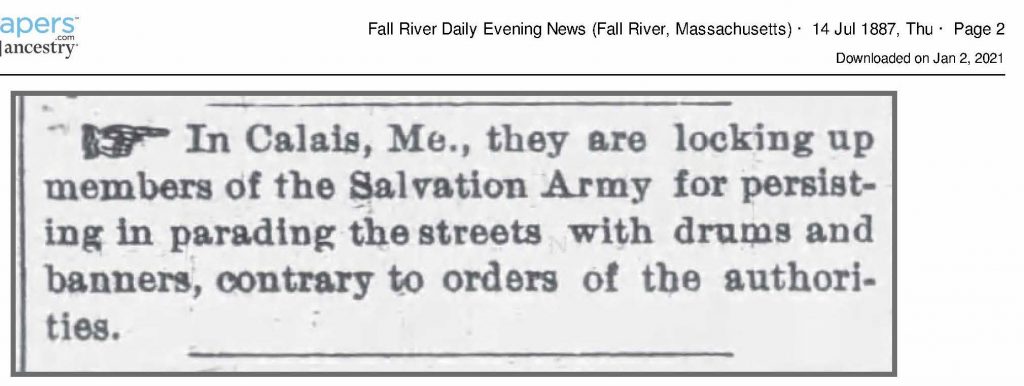
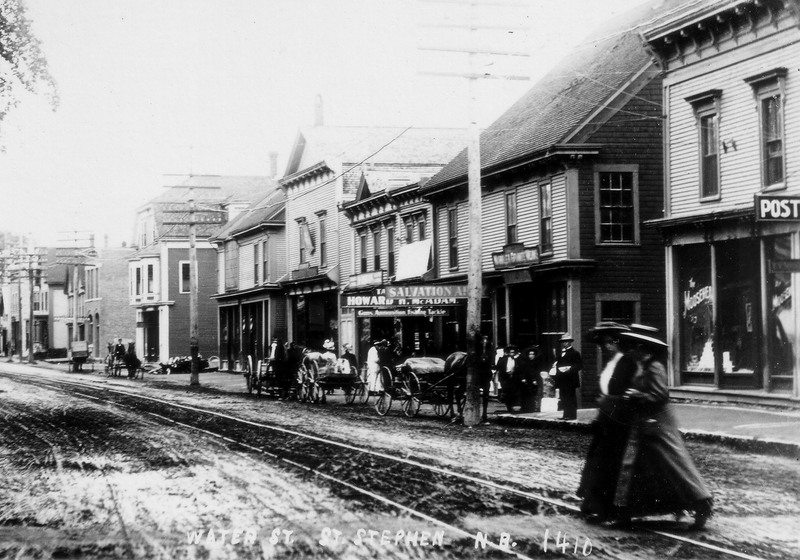
We thought we’d add a few other offbeat or interesting articles from the old days, such as this report from 1887 which we will make no attempt to explain as we can’t understand what threat the Salvation Army may have posed to civil order and peace.
Was the issue the noise of the drums? If so, why were the authorities also exercised over the banners ? We don’t know. but can report the court released these hooligans after they promised to cease and desist from marching through the streets of Calais. Possibly it has something to do with the headquarters of the Salvation Army being on Water Street in St. Stephen. The Calais authorities may have believed the Salvation Army was an actual army and the vanguard of a British force invading the United States. This is certainly a tale which social media could sell to many credulous folks today.
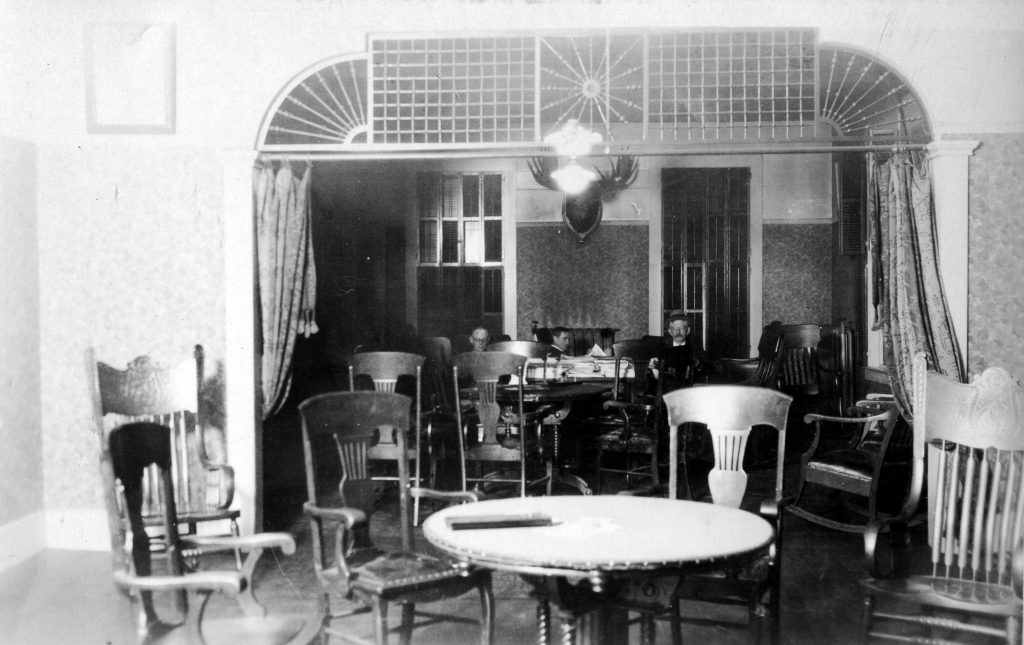
Card Room St Croix Club, bottom of Calais Avenue
A Old Card Story ‘Turns Up Calais’ Me. St Croix Courier 1885 A circumstance which is certainly worthy of note took place at a gentleman’s club-room of this city a few evenings ago. Four members of the club whose names we could mention if necessary and whose reliability no one would question for a moment sat down to play a social game of whist. A thorough deal of the cards was made by one of the number and the usual cut made for deal. The deal fell to another member of the company. He dealt the cards and the cut for trumps was made and the cards given around to the four players. When this was done one of the party laid down his hand expressing great surprise that he had thirteen card of one kind— namely spades. A second party laid down his hand with the some surprise he also having thirteen of a kind and the third and fourth men now placed their cards upon the table revealing the same kind of hands. One of the gentlemen belongs to St Stephen and he held all the trumps.
We’re reasonably sure the 1885 card game referred to above took place in the card room of St Croix Club at the bottom of Calais Avenue. What we can tell you for certain is the odds of this deal are astronomical (some mathematicians claim virtually impossible), if the cards are truly in a random position in the deck when dealt. Nonetheless such deals are reported from time to time although there remain skeptics.
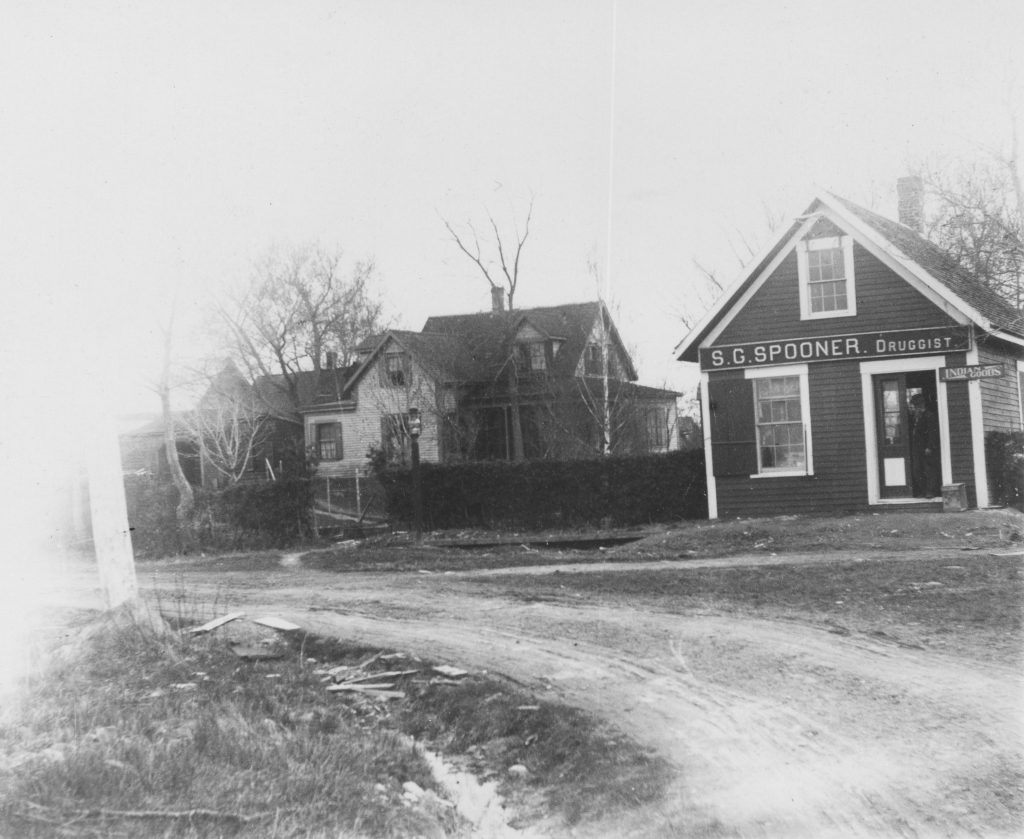
Romance and heartbreak were the theme of many stories in the newspapers of the 1800s. Most people relied on newspapers for fiction and heart rending romances along with adventure yarns were often featured, sometimes serialized, on the front page. Real life stories were also favorites, such as the one below. How accurate the reporting we can’t say, but this story was originally reported in the Calais Advertiser in 1874 so it may have some credibility.
A Local Romance. A. few years before the late war a certain Dr. Dow came to Calais, and boarded at the Calais House, then kept by Geo. Wilder. After a while he removed to Princeton, where he practiced medicine, and in the course of time married Miss Spooner, a very respectable young lady of that town. The marriage occurred just before the war began, and soon afterward Mr. Dow enlisted. While in the army a daughter was born to him, and for a time he regularly sent letters and money to his wife. But after a while he ceased to do so, and nothing was heard of him until sometime after the close of the war, when his wife learned that he had married the only daughter of a wealthy man, in another State, and was living with her. She went to see him, but, failing to find him, she saw his other wife, who said the doctor told her his first wife and their child were dead.
She then returned home and procured a divorce. Some time after this she went West to work, and falling sick, and finding herself unable to support her child, she wrote to her “ex-husband” asking him to contribute towards the support of his daughter. He replied in a penitent letter, expressing a desire to see her and talk over matters. By agreement they met in Boston, and he provided amply for his daughter’s support. A correspondence ensued between the divorced parties, which finally resulted in his offering to leave his second wife and re-marry the first one. He agreed and about two weeks ago the wedding ceremony was done over again and the twice married couple have gone off to seek their fortune. What has become of the other wife we have been unable to learn. This is a strange story, but it is vouched for by friends and acquaintances of the parties both in this city and in Princeton, and if we had the slightest doubt of its truthfulness we should not venture upon its publication. Calais, Me, Advertiser.
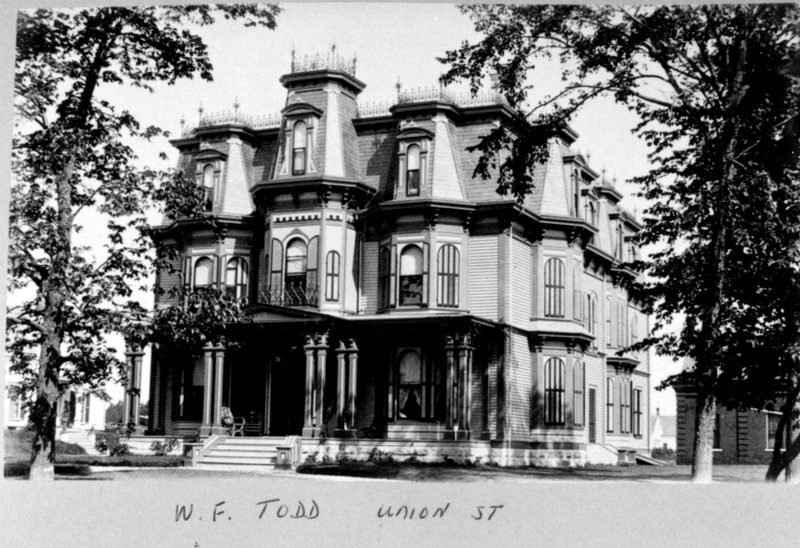
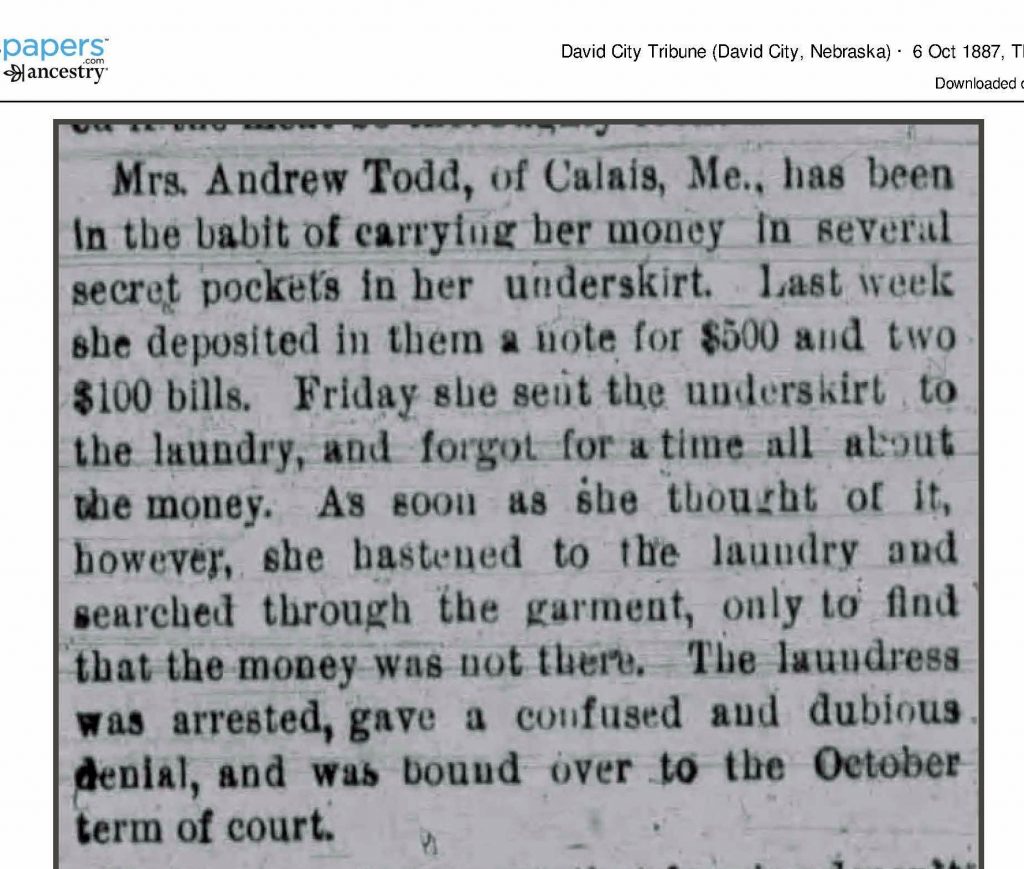
Mrs Andrew Todd of Calais Me has been In the habit of carrying her money in several secret pockets in her underskirt. Last week she deposited in them a note for $500 and two $100 bills. Friday she sent the underskirt to the laundry and forgot for a time all about the money. As soon as she thought of it however she hastened to the laundry and searched through the garment only to find that the money was not there. The laundress was arrested, gave a confused and dubious denial and was bound over to the October term of court.
Mrs. Todd was the wife of Andrew Todd, who had connections on both sides of the border. The fact she had $700 in her underwear, nearly $20000 in today’s dollars, indicates she was a bit eccentric and probably related to the lumber baron Todd’s. The Todd Mansion on Union Street in St. Stephen which is still standing is shown above. We know her husband Andrew went to California to make his fortune from an old article in the Historical Society newsletter.
The Stone House mentioned below is the late Brand Livingstone’s beautiful home on the River Road. He wrote the account below:
When Andrew Todd made his trip to California in 1850, his crowd had bought a vessel in Nova Scotia but according to the law as they were sailing for another United States port it was necessary to hale from one to keep within coasting regulations, so they tied up at the Stone House wharf, loaded some provisions from the ship’s store in the basement, and then set forth for the gold country.
This story was repeated to my Uncle Frank Livingstone many years ago when he was lunching with Andrew Todd one day atthe old Parker House in Boston. Mr. Todd stated that the only stop they made was at an island on the West coast of South America and there on that island they found but one white man among the natives. Andrew Todd asked him for his story and why he stayed there. His answer was as follows; Well, he said, I have married a native wife and am happy, When I was in the United States, the last job I had was driving a stage way down in Maine, between Eastport and Lubec, and Calais and Eastport.
We suspect the source of Mrs. Todd’s funds however was the lumber, not gold. Very, very few from this area were successful in the California gold fields.
We’ll close with this article from the Daily Union of Chattanooga, Tennessee of March 15, 1866:
A young woman belonging to St George N.B. who is a domestic with Mrs. S. B. Pool of Calais a year ago complained of a living creature in her stomach and applied to several physicians for medicine to relieve her of it but to no effect. At length it grew so troublesome and had such a debilitating effect on her that she went home to die as she was not expected to live for to live in such a state she knew was an impossibility. After she got home Dr. Rouse was called and after hearing her story left a powerful emetic, with directions on how and when to take it. She took the medicine as directed, and as a result a lizard of about six inches in length was ejected from her stomach. When it fell into the bowl, it is said, it fairly bit at both sides of it and jumped out and ran along the floor until it was killed by the persons in attendance. It had been in her stomach for four years.
It must be true – it was in the papers.
